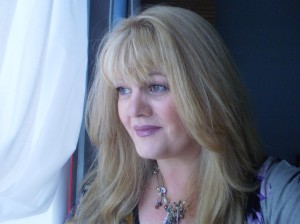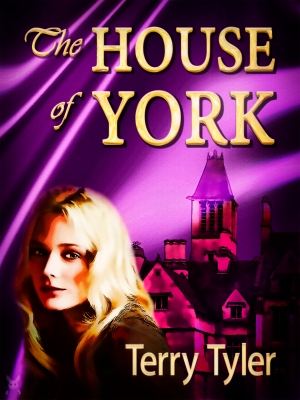Tags
I never saw that coming…
A man is like a novel: until the very last page you don’t know how it will end. Otherwise it wouldn’t be worth reading.
― Yevgeny Zamyatin, We
My guest today, Terry Tyler, talks about the importance of endings. So please grab your cup and one of these scones with jam and clotted cream, and have a seat.

Writer Terry Tyler lives in the north of England with her husband, and has published ten books on Amazon. Readers say she has created her own genre, which lies somewhere in the area of contemporary drama and romantic suspense, with the occasional bit of rock fiction and mystery thrown in.
When I got to the end of Terry’s The House of York, I had to read it again. Right away. While I’ll never know where the stuff in her head comes from, I was delighted that I could retrace the breadcrumbs she carefully planted as a trail leading to that amazing and completely unexpected ending. (see my review here)
Most writers focus a disproportionately huge amount of their attention on their book’s opening pages. “It’s all about hooking the reader,” we’re told. But… when is the last time someone raved to you about the beginning of a book? What we remember is the ending, how it tied all the story threads together, satisfied our curiosity, and earned the right to those precious words, “THE END”.
![The End [image credit: https://plus.google.com/112027307718368321051/posts]](https://barbtaub.com/wp-content/uploads/2015/11/random4pf.gif?w=529)
The End
[image credit: Stick Figure]
When History Needs a Helping Hand
–Guest post by Terry Tyler
So I just said to my husband, “No, I can’t come and watch the next series of ‘Hannibal’ with you because I need to write a guest post for Barb to go with her review of my new book.” He said, “Can’t you write those things in your sleep by now?”
The answer to that is hmm, sort of, if I was going to churn something out about how it’s a dark contemporary family drama inspired by the Wars of the Roses. I could re-hash my original blog post. But nearly 5K people have already read that; are they going to want to do so again? Answer: I very much doubt it. So I put my husband and Mr Lecter on hold and searched my blog-befuddled brain for another angle, eventually deciding on this: why I abandoned history for the last three chapters of The House of York, turning the story into something completely different…. and gave it a twist that’s proved a surprise to all who’ve read it so far. Quote: “I’ve just read the end! Bloody hell!”
Many ‘how to write’ articles stress the importance of a beginning a novel with a punch, so that people keep on reading. I think it’s equally, if not more, important to make sure the ending isn’t an anti-climax, so I try to make the last few chapters of my books more than just a winding down.
My last two books are modern day stories that retell Tudor history (*no knowledge of history necessary, can be read as just contemporary dramas*). The star of Kings and Queens was property developing magnate Harry Lanchester, (my very own Henry VIII), so the all important end of the novel was decided for me—he dies, a whole bunch of people cry alot, and a few see it as an opportunity to move their seat nearer the top of the boardroom table. With Last Child, I did something that goes against the grain a bit, for me: I gave it a nicely rounded off happy ending, with nutty Isabella (Bloody Mary Tudor) nicely despatched, and Erin (Good Queen Bess) queening it on the throne of Lanchester Estates. When I was writing The House of York, though, I wanted to do something more. Something unexpected. Something a bit sinister…
I decided on my super-duper twist about half way through the book, had great fun setting it up, and even more fun writing it. Anyone who is reading The House of York (especially if they cast an eye back to the Wars of the Roses) might expect the baddie to get his just desserts, and that be that. Indeed, just desserts are duly received. But something else has been going on behind the scenes, all the way through….
…. enough said! So thank you, kings and queens and lords and ladies of York and Lancaster, you provided me with some great material—but, this time, I felt history needed a helping hand. I hope Barb approved.
 Note from Barb: I do approve! Please click here for my review of Terry Tyler’s new book, The House of York.
Note from Barb: I do approve! Please click here for my review of Terry Tyler’s new book, The House of York.
The House of York ~ a contemporary family drama, spanning the years 1993 – 2014.
 Widowed single mum, Lisa Grey, and wealthy businessman, Elias York, are young and madly in love. A recipe for happiness? But Lisa is marrying into a complicated family. Her new sister-in-law doesn’t want to know her. Middle brother Gabriel’s marriage suffers under a cloud of infidelity and gambling debts, while the youngest, Richard, keeps his dark secrets well hidden—and his wife suffers in silence. Lisa and her mother are bonded by their powerful intuition, but dare not voice their fears about York Towers—or certain members of the family…. Love and loss, abduction, incestuous desires and murderous intent form the basis of this compelling saga in which horrors float just beneath the surface, to bring forth a shocking outcome. History lovers may be interested to know that The House of York is loosely based on events during the era of the Wars of the Roses.
Widowed single mum, Lisa Grey, and wealthy businessman, Elias York, are young and madly in love. A recipe for happiness? But Lisa is marrying into a complicated family. Her new sister-in-law doesn’t want to know her. Middle brother Gabriel’s marriage suffers under a cloud of infidelity and gambling debts, while the youngest, Richard, keeps his dark secrets well hidden—and his wife suffers in silence. Lisa and her mother are bonded by their powerful intuition, but dare not voice their fears about York Towers—or certain members of the family…. Love and loss, abduction, incestuous desires and murderous intent form the basis of this compelling saga in which horrors float just beneath the surface, to bring forth a shocking outcome. History lovers may be interested to know that The House of York is loosely based on events during the era of the Wars of the Roses.
- Book Title: The House of York
- Author: Terry Tyler
- Genre: Contemporary Drama
Length: 443 pages
Release Date: October 19, 2015
Purchase Links: Amazon UK| Amazon US

Well now I HAVE to read this one too!!!
LikeLike
Well, I hope you do, Jessie! xx Thanks for reading 🙂
LikeLiked by 1 person
Great guest post. I am familiar with Terry as a prolific twitterer and so it’s interesting to have the surface scratched a little more as to her inspirations and genre. Will be checking her work out – thanks Barb! X
LikeLike
Thank you for reading, GDF ~ and hello! So nice when the Twitter retweet becomes a blog read too! Something all those ‘Contributed tweets are provided by Mr Robot’ lot never experience 🙂
LikeLiked by 1 person
waves absolutely – always nice to discover a real person behind the tweets! I can’t bear the generic brigade – actually puts me off clicking. Looking forward to learning more & checking out your books. Love the concept behind your plots.
LikeLike
Me too! I mean, me too, I hate the generic brigade….! Oh, okay, I love the concept behind my plots, as well, ha ha! 😉
LikeLiked by 1 person
Please see main page for full ‘thank you’! ps, LOVE the ‘The End’ Stick Figure thing 🙂
LikeLike
Very well said, I was only discussing books endings with an avid reader a couple of days ago, my avid reader was bemoaning the let down in book endings recently, now all we need is you to get into print versions of your books, and I can send her a copy of a book with a SUPER ending.
LikeLike
Thanks, Rosie – yes, I am always so disappointed when an ending is an anti climax, as Barb says, it matters more than people give it credit for!
LikeLike
All these temptations for this book are becoming unbearable T – and Barb I lay the blame firmly at your door too!! Can. Not. Wait. 🙂
LikeLike
So intriguing. I have a week’s holiday coming up next month so this will be on the tbr pile – after Kings and Queens
LikeLike
Thanks, Mary and Georgia x
LikeLike
Endings are even more important than beginnings..they are the aftertaste, that lingers long after the novel has been closed. If the ending grabbed you, you will read other books by the same writer…I always spend ages and ages on endings….proportionally…sometimes even redrafting at 3rd edit stage. I love it when the ending ‘works’ both in my and other writers’ work.. And you know when it does, coz you look up, take a deep breath and go: aaaahhhhh…..
LikeLike
Yes indeed – I always get about 4 different ideas for the ending, per book! And work out the end long before I get to it. I just read a terrific book, but the end 10% was just a slow winding down and sewing up, still good, but it left me with ‘is that it?’. It’s the end you remember when you write the review and give the star rating, not the beginning.
LikeLike
The one thing about being an indie author is that WE can choose the ending we like. (After consulting beta readers and any friends/readers who can be guaranteed to give a good honest opinion.)
LikeLike
Indeed, Lizzie, nail on the head time! I was fairly sure about this ending, a few worries about whether or not it was too outlandish – but Julia really liked it and my other beta reader thought the same as Barb – I am sure an ‘editor’ would never have let me do it!!!
LikeLiked by 1 person
pOWER TO THE INDIES !!
LikeLike
I’m so looking forward to reading this! And Terry, I agree completely. Endings to all writing, whatever it is, should be stonking good so that the reader really remembers the book, essay, thesis, report or whatever it happens to be! I am very often disappointed by endings, but that has never been true of your books. All the ones I have read have been great, but it sounds as if this one is brilliant!
LikeLike
Thank you, V ~ I’ve read so many book where the ending is just a slow winding down and resolution. I know not every book can have a massive twist in the last chapter (and, indeed, mine don’t either!), but there needs to be SOMETHING other than just all the ends tying off nicely, I think. Barb’s so right – it’s the ending that makes you say to people ‘You have to read this book!’
LikeLike
Sounds intriguing! Love historical fiction.
LikeLike
It isn’t historical fiction, Ali…. just inspired by. Very much contemporary!
LikeLiked by 1 person